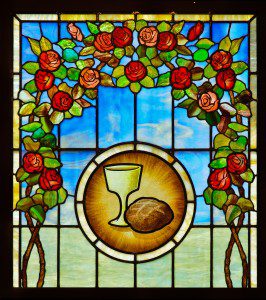Holy Thursday Readings
Listen to the reflection
 “He was only at his best when things were at theirs.” Years ago, when I first read those words, applied I think to some King of England or Prince of Wales, they struck me as a very harsh criticism indeed, particularly of an Englishman. After all, this was the land where, according to Kipling, a fellow was supposed to prove his mettle by keeping his head when everyone around him was losing theirs. “Then you will be a man, my son.”
“He was only at his best when things were at theirs.” Years ago, when I first read those words, applied I think to some King of England or Prince of Wales, they struck me as a very harsh criticism indeed, particularly of an Englishman. After all, this was the land where, according to Kipling, a fellow was supposed to prove his mettle by keeping his head when everyone around him was losing theirs. “Then you will be a man, my son.”
We all admire people who perform admirably in a crisis. I remember being impressed by General Kutuzov in War and Peace. According to Tolstoy, in the chaos of battle, the orders of even a good commander are not obeyed. A commander’s real role is to sustain everyone’s confidence, by pretending he was about to order what has already happened without hisdirection. In this way, old Kutuzov forced Napoleon to retreat from Russia.
Outside the pages of books, I’ve had equal admiration for harried mothers who while trying to do three things at once, are pestered by a child demanding attention. More often than not they manage to muster enough composure to turn to the child with a smile and say, “Yes dear, what is it.” I wonder if even Kutuzov could have achieved that kind of victory.
“He was only at his best when things were at theirs.” As soon as I read the words, I wondered if they described me. I find it easy enough to be relaxed and affable when things are going well. But let a few difficulties arise, perhaps a slight toothache, or a looming deadline, and I become distinctly less sociable and sympathetic.
In light of all this, I am even more astonished by Jesus, as he is revealed to us in our Gospel today. He is, in effect, a convicted criminal, waiting out his last few hours, before being executed in a particularly horrific manner. And as John assures us, our Lord was fully aware of what was about to happen to him. Under similar circumstances, I imagine I would be cringing with terror in some corner. But Jesus responds differently.
I’m sure, at one time or another, you have been asked the question, “If you knew you were going to die tomorrow, what would you do today?” I’ve always thought that it would be great to be able to answer that we would carry on doing whatever we were doing at the moment, because presumably we all realize that tomorrow isn’t guaranteed to us, so we ought to be doing the right thing all along.
In a sense, this is true of Jesus. In the face of his impending death, he carries on just as he has always done. John tells us, “He had loved his own in this world, and he would show his love for them to the end.” In other words, he just kept on loving.
But it is also true that on the night before he died, Jesus did some very specific things, and naturally, as Christians, we want to pay special attention to what he chose to do with these last precious hours of his earthly life and ministry.
It was the season of Passover, so Jesus’ mind, and the minds of the Twelve, must have been filled with the reading from Exodus that we hear at Mass today about the deliverance of the chosen people out of bondage in Egypt. Each family was to slaughter a year-old male lamb, without blemish, and eat its roasted flesh that same night, with unleavened bread and bitter herbs. They were to take some of the blood of the lamb, and mark the doorposts and the lintel of their houses with it. And the blood of the lamb would protect them from the wrath of God. That day was to be a memorial feast for the people in every generation. It was to be, for them, a perpetual institution.
On the night he was betrayed, Jesus established a new covenant, to be celebrated until he comes again in glory. This time, he himself was to be the lamb who was slain. The disciples were to eat his body, and his blood would be our deliverance. It would restore our broken relationship with God, and with one another. Now every Eucharist is a Passover feast. We can see the wine, and the unleavened bread, but the lamb is there as well: the Lamb of God, who takes away the sins of the world.
Then Jesus rose from the meal and took off his cloak. He tied a towel around himself, poured water into a basin, and began to wash and dry his disciples’ feet. Now in the Jewish culture of the time, this was the ultimate sign of humility. No one, not even a slave, was required to wash the feet of another, yet Jesus chose to do so in the last moments before his Passion and death.
And consider whose feet he was washing. He knew full well that these were men who would run away when the crisis came. Included among them were Peter who would deny him three times, and even Judas Iscariot. Reflect on that for a moment. Jesus spent some of the last minutes of quiet before his Passion, humbly washing the feet of the very man who would betray him to suffering and death.
Do you remember when Jesus said of the teachers of his time, do what they say, but not as they do? In Jesus, on the contrary, we have someone who lives what he preaches. He commanded us to love our enemies. And on the night he was betrayed, he fed his betrayer with his body and blood, and washed his feet.
And then Jesus said, “What I just did was to give you an example: as I have done, so you must do.” Why did Jesus give this particular example at this crucial moment? Perhaps because there was a connection between what he was doing for the Twelve, and what was about to be done to him. Among the causes of his impending crucifixion, was humanity’s failure to realize, that however good the intentions of the people involved, the conventional wisdom about the exercise of power, always leads to the violent destruction of the innocent. It is only when the Teachers, and Lords, and Masters of the world, choose to get down on their knees and start washing feet, that we will know that the Kingdom has truly come. Jesus has shown us the way.
 Rev. Charles B. Gordon, C.S.C., is co-director of The Garaventa Center at The University of Portland. He writes and records a regular reflection called “Fractio Verbi.”
Rev. Charles B. Gordon, C.S.C., is co-director of The Garaventa Center at The University of Portland. He writes and records a regular reflection called “Fractio Verbi.”



